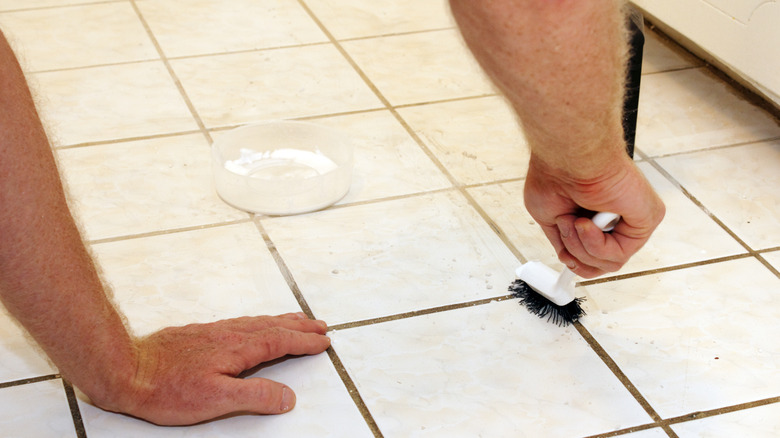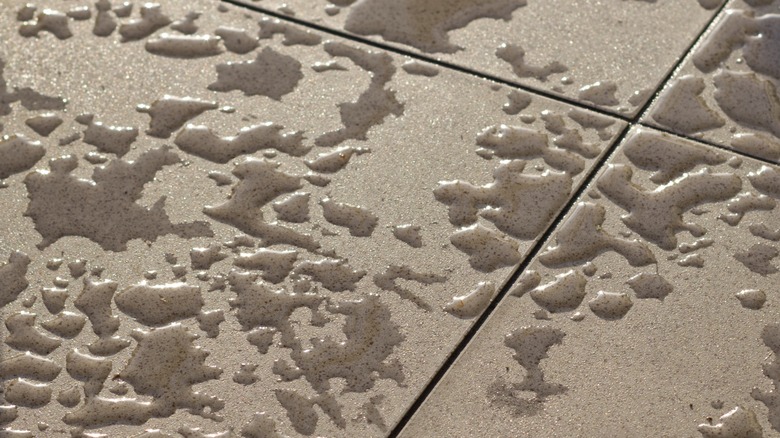The Flooring Material That's Naturally Odor-Resistant
We may receive a commission on purchases made from links.
Choosing the right flooring for your home involves many variables, such as how much foot traffic you expect, whether you have pets or children, and what aesthetic you're looking to achieve. You also don't want to be stuck with a floor that traps odors — something that is more likely to happen if you do have a ton of foot traffic, fur babies, or kids. Enter the solution: glazed ceramic tile.
Ceramic tiles are made from clay that's shaped and fired at high temperatures to create a hard, durable surface. For unglazed ceramic tiles, this is where the process ends, and as a result, there is still a degree of porosity. However, glazed tiles are fired one more time to create the glaze over them — and that's where the magic happens.
Once glazed, the tiles become non-porous and almost completely impenetrable. In other words, they won't absorb liquids, preventing odors caused by things unavoidable in busy homes, like spills and walked-in dirt. That's in stark contrast to many other flooring types like hardwood, or even unglazed ceramic tiles. As a result, glazed ceramic tiles are a much more low-maintenance option for many. Having said that, there are still some things to keep in mind if you want your floor to be completely odor-free.
Unsealed cement grout can still trap some odors
While glazed ceramic tiles are odor-resistant, the grout used to install them might not be. Epoxy-based grout is water-resistant, but cement-based grout is porous, so if the latter is what's been used in your flooring, it's definitely necessary to seal the grout to keep those odors out. Luckily, that's easy enough to DIY. In fact, grout sealer will set you back less than $9 on Amazon.
Once your grout is sealed (or if it's already epoxy-based), you can go ahead and clean those floors and keep them odor-free. To get started, you can sweep or vacuum large debris from the floor first. It's also best to turn off the roller in a standing vacuum, as it can scatter dirt and dust across the floor. Choose a narrow attachment to get into the spaces between the tile and the wall and any grout lines.
Next, prepare a cleaning solution for your ceramic tile floors by mixing warm water with mild detergent or a cleaning product specifically formulated for these types of floors. You'll want to avoid harsh chemical cleaners or abrasive cleaners, as they could damage the grout or tile. Mop the floors but leave the solution on dirtier sections for a few minutes, then rinse with warm water. Finally, dry it all up with a microfiber cloth and you're good to go.
Additional benefit: moisture resistance
One of the other major benefits of glazed ceramic tile floors is that they're moisture-resistant ... and if you've ever stepped foot in a place with damp-smelling flooring, you'll know that plays a big role in odor-resistance, too. So long as the mop you're using is clean and the cleaning solution you use smells great, once everything is dry, you won't have to worry about that musty aroma wafting through your home.
Of course, the benefits of moisture resistance go beyond odor. Water damage on some flooring types can be incredibly difficult to reverse, and you may even need to call in professionals. It can also harbor mold and mildew, which, on top of potentially causing musty odors, can cause serious damage to your home and even have some serious health implications for you and anyone else living in your home.
So, if you're thinking of re-tiling soon, consider glazed ceramic tiling. You'll certainly be able to rest easy knowing water damage and all the risks that come with it don't stand a chance. You'll also breathe easier — not just because of the hygiene aspect, but because this flooring option is odor-free.



